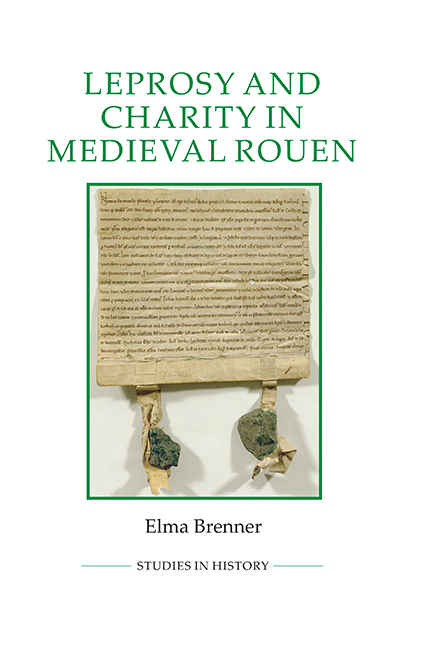Book contents
- Frontmatter
- Dedication
- Contents
- List of Illustrations
- Acknowledgements
- Abbreviations
- Introduction: Leprosy, Charity and Rouen
- 1 Rouen’s Principal Leper House: Mont-aux-Malades and Its Endowment
- 2 Charity and Community at Mont-aux-Malades
- 3 Rouen’s Other Leper Houses: Institutions, Gender and Status
- 4 Leprosy and the Medical World of Rouen
- 5 Leprosy and the Religious Culture of Rouen
- Conclusion
- Appendix 1 A Note on Sources
- Appendix 2 Charters and other Documents Relating to Leprosy in Rouen, c. 1100–c. 1500
- Bibliography
- Index
4 - Leprosy and the Medical World of Rouen
Published online by Cambridge University Press: 07 May 2022
- Frontmatter
- Dedication
- Contents
- List of Illustrations
- Acknowledgements
- Abbreviations
- Introduction: Leprosy, Charity and Rouen
- 1 Rouen’s Principal Leper House: Mont-aux-Malades and Its Endowment
- 2 Charity and Community at Mont-aux-Malades
- 3 Rouen’s Other Leper Houses: Institutions, Gender and Status
- 4 Leprosy and the Medical World of Rouen
- 5 Leprosy and the Religious Culture of Rouen
- Conclusion
- Appendix 1 A Note on Sources
- Appendix 2 Charters and other Documents Relating to Leprosy in Rouen, c. 1100–c. 1500
- Bibliography
- Index
Summary
While leprosy sufferers were an obvious object of medical attention, the understanding of the disease, and responses to it, changed in Rouen between the twelfth and fifteenth centuries. The Black Death of the mid-fourteenth century undoubtedly had a great impact on the understanding of disease and attitudes towards the sick, including lepers. However, prior to the plague, it is clear that some parties in Rouen were already concerned about leprosy and contagion, while others did not fear to come into frequent contact with the sick. This variation in attitudes and behaviour suggests that this was a disease that provoked particularly complex responses. This chapter places leprosy in the broader context of medical practices and practitioners in medieval Rouen, and examines the bodily care of lepers, diagnosis and ideas about contagion. Physicians were present in the city from the early Middle Ages, and were often members of the ecclesiastical elite, as well as charitable benefactors. From the thirteenth century, lepers received attention from physicians and surgeons within and outside leper houses, particularly as diagnostic examinations became more common. They also benefited from bodily care in terms of the provision of food, shelter and other necessities. In the fifteenth century, anxieties about leprosy and contagion increased markedly, and the disease featured among those threats targeted in measures for the public health of the city.
The practice of medicine in medieval Rouen
The physical care of the sick and the disabled was wide-ranging in the Middle Ages, involving not only interventions by university-educated physicians, but also care administered by surgeons, barbers, midwives, professed religious, lay religious, family members and friends. Measures aimed at ensuring bodily wellbeing, particularly the provision of food, clothing and shelter, three of the biblical works of mercy, formed an essential part of physical care. As well as enabling carers to fulfil Christian works, such measures reflected the ‘non-naturals’, which were environmental and psychological factors believed to cause health or illness. The six non-naturals consisted of air, sleep, exercise, diet, bodily evacuation and emotional wellbeing. Like the understanding that health resulted from a balance of the four bodily humours (blood, yellow bile, black bile and phlegm), and that each individual had his or her own specific humoral (complexional) balance, the non-naturals formed part of the Galenic model of health and disease.
- Type
- Chapter
- Information
- Leprosy and Charity in Medieval Rouen , pp. 83 - 108Publisher: Boydell & BrewerPrint publication year: 2015



